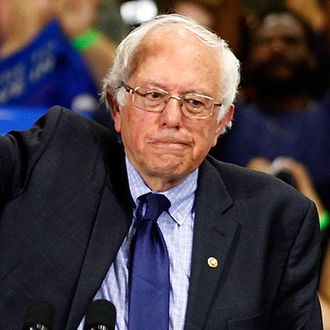
Throughout the Democratic presidential nominating contest, the operative assumption in both the Clinton and Sanders camps has been that superdelegates should play a subordinate role to pledged delegates in determining the winner. This means that, barring some calamity between the end of the primaries and the convention, if a candidate wins a majority of pledged delegates, that’s the ballgame.
But there’s always been some quiet hedge-betting. The Clinton campaign has made a regular point of touting HRC’s lead in popular votes alongside her lead in pledged delegates, as though it has some independent significance. And now, as the odds against catching Clinton in pledged delegates grow steadily higher, Bernie Sanders and his campaign are beginning to talk of the convention as “contested” so long as superdelegates are needed to constitute an actual majority of total delegates.
Speaking at the National Press Club in Washington, D.C., the Vermont senator argued that Clinton “will need superdelegates to take her over the top at the convention in Philadelphia. In other words, it will be a contested convention.”
You actually cannot have a “contested convention” unless someone is doing the “contesting,” so this formulation is too clever by half. Instead of agreeing that superdelegates should simply ratify the winner of pledged delegates, Sanders now seems to be arguing that in individual states superdelegates should vote for the “winner” of either pledged delegates or popular votes (presumably depending on which measure is more beneficial to his own candidacy).
The practical import of this shifty standard is that Team Sanders will be justified in treating Clinton’s nomination as in question until the first ballot in Philadelphia has ended, which in turn will make challenges on credentials, rules, and, most of all, the platform in order.
It would be helpful not only for Democrats but for those of us trying to keep score to clearly understand the finish line for each of the two candidates. Will Sanders “contest” a pledged majority of delegates for Clinton? Will Clinton continue to argue in the alternative that popular votes matter as much as pledged delegates? Are there circumstances where Clinton’s already claimed victory but Sanders is not conceding? Inquiring minds want to know.






























